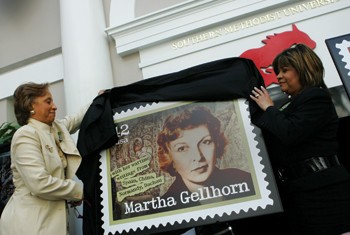
Dallas Postmaster Pat Williams (left) and KDFW Fox 4 news anchor Clarice Tinsley (right) unveil one of the new “American Journalists” commemorative stamps Tuesday morning in the Hughes-Trigg Commons. Tinsley, along with other local journalists, held a panel discussion before the unveiling. (John Schreiber)
The United States Postal Service commemorated past American wartime journalists on U.S. postage stamps at the American Journalist Commemorative Stamp Event Tuesday in Hughes-Trigg.
To complement the stamp unveiling, a panel of local news anchors and journalists was present to honor the remembered journalists and talk about issues facing the media in both the past and present.
The panel consisted of Ken Kalthoff, news anchor at KXAS NBC 5; Bob Ray Sanders, general columnist at the Fort Worth Star-Telegram; Tracy Rowlett, news anchor at KTVT CBS 11; Clarice Tinsley, news anchor at KDFW FOX 4; and Miguel Amante, reporter for NBC Universal-Telemundo. John McCaa, news anchor for WFAA Channel 8, was the moderator.
The panelists began the discussion by addressing the notion of inserting opinion into the news that they report. John McCaa felt strongly on the matter, saying that journalists have opinions on almost every matter reported, but it is up to the audience to form their own opinions and not be influenced by those reporting the news.
“All these [panelists] probably have had experiences in which they feel strongly about this story or that story, but just because it doesn’t look like we don’t have an opinion on the air doesn’t mean we don’t have an opinion,” McCaa said. “We are just trying to be as fair as possible to as many sides as possible.”
The panel also discussed the slow but steady transition to a more diverse news-scape.
In addition, Tinsley discussed her experiences as a woman in this transition of more equal gender roles in the news and cited Martha Gellhorn, a female journalist who was commemorated with a stamp, as a hero in the news business beginning in the 1930s.
“I will admit it was hard as a woman beginning in 1975, fresh out of college. The only thing I could do was show up, work hard and do the very best that I could every day,” Tinsley said. “There was so much out of my control; I could have been out of a job the next day, all I could do was work my hardest.
“Martha Gellhorn, one of my personal heroes, and honoree today, must have had a much rougher time than I, but still became one of the greatest female war correspondents of the 20th century,” she said.
Continuing the discussion about minorities in news media, Sanders joined the discussion, saying that he could remember a time when African-Americans were only reported on and weren’t allowed to do the reporting.
“I can remember a time when people like me [African-Americans] weren’t allowed in the news, unless they killed someone,” Sanders said. “The first time I wrote a story I had to call my dad and tell him I wasn’t arrested and in the news, I had written the story; that’s why my name was on the page. The news truly is transitioning scene, something that couldn’t be said until about 15 years ago.”
The discussion wrapped up with the journalists reflecting on the many times they fought to get what was important to them in the news, and noted that every journalist honored with a stamp had fought valiantly to get their stories of what they thought was important into the news.
“Every one of those journalists on the stamps fought to put their stories in their mediums, and that is why they became some of the greatest war correspondents of the 20th century; that’s why we are honoring them today,” McCaa said.
The journalists honored were Eric Sevarald for his reporting from Paris as German troops marched in; Martha Gellhorn for her wartime writings from Spain, China and Normandy; Ruben Salazar for reporting during Chicano protest rally in East Los Angeles; George Polk for covering the civil war in Greece; and John Hersey for reporting the war’s impact on the citizens of Japan and Italy.








